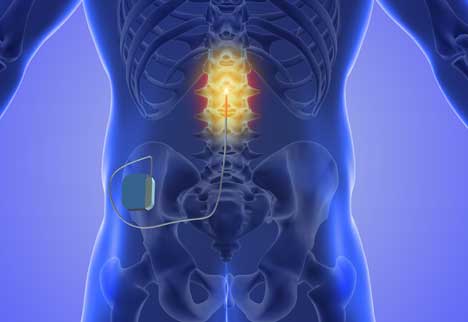Spinal Cord Stimulation
If you’re living with chronic pain, a spinal cord stimulator could control your symptoms and reduce your need for pain medication. Rick Buenaventura, MD, is a board-certified physician at Pain Relief of Dayton in Centerville, Ohio, who offers the most advanced interventional pain management techniques available, including spinal cord stimulation.
What is a spinal cord stimulator?
A spinal cord stimulator (SCS) is a unique interventional pain management device that uses neuromodulation to provide pain relief. This small, implantable unit works by altering the nerve activity in certain parts of your body by delivering gentle pulses of electrical stimulation.
This type of therapy usually doesn’t eliminate your pain completely, but it does reduce your pain sensations exponentially. When activated, most men and women with an SCS device only have a mild tingling sensation instead of intense pain.
How does a spinal cord stimulator work?
There are different kinds of spinal cord stimulator devices, but they all work the same way. Each one has a tiny battery-operated pulse generator and a wire to deliver electric stimulation. A spinal cord stimulator also comes with a small remote control so you can turn it on and off as desired and adjust your pain management settings.
When you have spinal cord stimulation, Dr. Buenaventura implants your device underneath your skin near the area of your spine triggering your pain. When you turn it on, your SCS delivers small pulses of electrical current to these nerve fibers. This electrical stimulation interrupts the pain signals, so they diminish by the time they reach your brain.

Dr. Buenaventura might recommend a spinal cord stimulator if you have chronic neck, back, or lower extremity pain that hasn’t responded to other interventional pain management techniques.
Am I a good candidate for a spinal cord stimulator?
Spinal cord stimulators offer several advantages, but Dr. Buenaventura works closely with you before implanting your device to make sure you’re a good candidate.
Conditions that often respond to SCS include:
- Failed back surgery syndrome (FBSS)
- Complex regional pain syndrome (CRPS)
- Chronic arm or leg pain, especially sciatica
- Spinal stenosis
In most cases, Dr. Buenaventura doesn’t recommend a spinal cord stimulator if you have certain cardiac pacemakers, have a high risk of contracting infections near your spine, or suffer from bleeding disorders. SCS might also not be a good option if you have a psychiatric condition associated with your pain or an unmanaged drug addiction.
Dr. Buenaventura usually recommends testing a spinal cord stimulator during a trial period before he implants your device.
To schedule an appointment please call (937) 395-1300.

